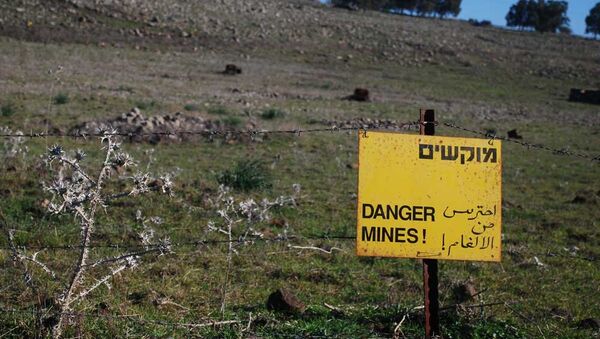Although Israel doesn’t confirm or deny reports about its military activity abroad, it was widely reported that all of its previous attacks on Syria were ostensibly to decrease Hezbollah’s fighting capabilities. Given the fact that the organization has been instrumental in successfully fighting against ISIL, al-Nusra, and other terrorist groups, Israel’s selective interventions against Hezbollah can be described as attempts to tip the balance of power against it.
The thinking goes that if Hezbollah can be forced into equal footing with the terrorists, then they can all fight it out and destroy one another to Israel’s advantage. This dangerous game comes with a catch, however, since Israel has never targeted the terrorists in Syria and instead focuses exclusively on Hezbollah. Israel’s phobia of all things even remotely linked to Iran and the paranoia it has about Tehran’s intentions have blinded it to the fact that such strikes may create the self-fulfilling prophecy that its decision makers dread.
The Iranian Obsession
Iran, more so than any other topic in the Mideast, is what keeps Israel’s leaders up at night. They’ve developed an obsession over the country and haven’t been able to come to terms with the fact that their long-standing perceptions of it are actually perversions of reality. From misquoting former President Ahmadinejad and creating the ‘wipe off the map’ scare-tactic controversy, to falsely stating that the country is building nuclear weapons (and exaggerating their capability to do so at that), Israel’s leaders have been intent to position Iran as the ultimate bad guy. Thus, it’s predictable that they’d imagine some kind of hidden Iranian hand behind all of Israel’s real or inflated fears.
This is where Hezbollah and Syria come in. The Iranian-friendly resistance organization embarrassed Israel in the eyes of the world during the 2006 War on Lebanon, and Israel’s held a huge grudge ever since. When the attempted Color Revolution in Syria began to transform into a terrorist-led unconventional war, Hezbollah quickly rushed to the aid of its ally to help fend off the extremists. The Iranians support the Syrians in their war on terror and send military advisors to assist as well, hence the reasonable explanation for why there would be an Iranian advisor in the company of Hezbollah members inside Syria in the first place.
The victims were located near the Israeli border particularly because that’s where ISIL just gained its newest batch of recruits as a result of the mass defection of ‘moderate opposition’ members there late last month. This provided ISIL the possibility to enact a future flanking maneuver against the Syrian Arab Army and, given rapid success on the battlefield, the opportunity to make a run on Damascus. Given how sensitive of a threat this has become, it’s self-explanatory why the Syrians and their Iranian and Hezbollah allies would be focusing on this seemingly obscure front of the war (the ‘opposition’s’ defection to ISIL wasn’t widely broadcast to Western audiences). But, given how adverse Israel is to anything Iran or Iranian-related (like Hezbollah), its leaders didn’t see an anti-terrorist fighting force when they peered across their occupied portion of the Golan Heights, but rather a gathering of bad guys apparently plotting their next attack.
Turning Good Guys Into Bad Guys
Iran and Hezbollah both have strong track records of fighting back against the terrorists, with the former recently demonstrating their success in Iraq and the latter having done so in Syria over the past 4 years. Although both may have their bones to pick with Israel and its regional policy, they’re obviously focusing on the most imminent threat at the moment, and that’s ISIL. Since the terrorists have gained global notoriety through their highly publicized beheadings and rampant atrocities, one would assume that the world would support anyone that’s making visible progress in pushing them back, but such an assumption wouldn’t be taking into account Israeli perceptions of the situation.
As mentioned earlier, Israel’s obsession over Iran means that it sees its rival’s fingerprints on all sorts of far-fetched threats, while blinding it to the actual ones right in front of it. This is why it subjectively identifies Iranian-affiliated Hezbollah as a greater danger than ISIL, despite the former’s defensive military actions in 2006 and the latter’s obvious expansionist track record in 2014. But then again, ISIL has coincidentally never really threatened Israel or its interests, which may explain why Tel Aviv carries out attacks to damage Hezbollah in order to benefit the ‘Caliphate’. In an Orwellian manner, Israel has thus convinced itself that the good guys in the Mideast’s regional war on terror are really the bad guys, thus turning reality on its head and doing so with acute consequences.
A Nightmare Come True
Iran and Hezbollah had been scarecrow threats to Israel and defensive checks on its aggression in the past, but after the latest anti-Hezbollah strike that also killed the Iranian military advisor and Jihad Mughniyeh, the two may start to proactively fight back. They’ve been resisting Israel’s regional policies for decades, but now may be the time for them to do so in a different manner. The commander of Iran’s Revolutionary Guards warned Israel of “devastating thunderbolts” in the aftermath of the attack, and Hezbollah said that a response was “inevitable”.
Both entities are wiser than Hamas (which had its own catastrophic war with Israel last summer), so it’s not anticipated that they would allow for Israel to exploit their reaction through provoking an expanded Israeli War on Syria (likely involving the ‘anti-ISIL coalition’) or a larger regional conflict. The real nightmare for Israeli decision makers may then actually come true, since instead of a being one where Iran and Hezbollah responding to Israel in ways that are expected, the two may join forces to trap it in a repeat of the 2006 disaster that it still hasn’t lived down.


